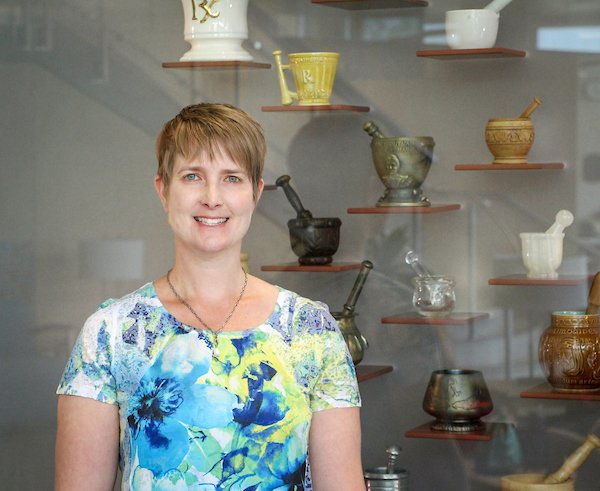
How do pharmacists make a difference?
Concordia University Wisconsin’s School of Pharmacy has a robust faculty with diverse backgrounds and experiences. Associate Professor of Pharmacy Practice Sarah Ray, PharmD, BPS, practices as a clinical pharmacist at Progressive Community Health Center and directs a Post Graduate Year 1 (PGY1) pharmacy residency program.
Additionally, Sarah co-precepts the PGY1 pharmacy practice resident at her clinic site, as well as an ambulatory care APPE rotation. Sarah is active within pharmacy professional organizations.
Note: Sarah’s responses are typed in italics.
Tell us a little about yourself.
I have been a pharmacist since 1997, and my work settings have often given me the opportunity to serve patients in community pharmacies or primary care clinics. It’s also included students and pharmacy residents so that they get the opportunity to help patients make the best use of their medications. Since 2012 I’ve been a faculty member at Concordia University Wisconsin School of Pharmacy. I teach students in classes on campus, as well as practicing in primary care clinics 1-2 days per week.
What made you want to become a pharmacist?
I’ve always wanted to be a teacher. When I started as a pharmacy clerk at an independent pharmacy in high school, I started to learn how important the role of the pharmacist was in teaching patients. Pharmacists teach their patients how to manage their medications and their chronic illnesses. I wanted to be able to make an impact on public health and individual patients’ health.
What area of pharmacy practice do you work in?
I’m passionate about ambulatory care. I work alongside primary care providers like doctors, nurse practitioners, and physician assistants in primary care clinics. This means I get to serve patients who don’t always have access to quality and affordable health care. I help patients manage their chronic illnesses like diabetes, high blood pressure, and high cholesterol.
Can you tell us about a time when you felt like you made a difference in the life of a patient?
I was working at a primary care clinic in Milwaukee that served primarily urban, underserved patients. During this time, I was asked to help patients who had uncontrolled diabetes. I would meet with these patients on a regular basis. Part of my job was to adjust medications to help patients lower their blood sugar numbers. Also, I helped patients work on their lifestyle goals, like exercising or eating less sugary foods/drinks.
Pharmacy students and residents worked with me at the clinic. A few students also helped me collect data on how well we helped these patients. Patients who met with one of the clinical pharmacists (myself or my faculty partner) were able to lower their A1c from an average of 9.8% to 8.4%. This means they lowered their average blood sugar from 235 mg/dL to 194 mg/dL. The goal is an A1c below 7%. Lowering the A1c means we were able to help patients delay or avoid complications like eye problems, kidney problems, or heart attacks.
We also helped patients stop smoking. Additionally, we improved rates of patient adherence to other important medications that are prescribed to protect their kidneys and heart. We surveyed the primary care providers and they were satisfied with the care we provided to their patients. These primary care providers thought we helped improve the continuity of care for a vulnerable patient population. We also surveyed some of the patients at the clinic. They described having positive relationships with the pharmacist. Also, overall, they described the pharmacist as person-centered and a health care provider who provided valuable medication education.
This research is important because it showed the value of the pharmacist in helping patients achieve their healthcare goals. Because of this research, pharmacists have been able to start services in more clinics to help more patients who have chronic illnesses. Also, by involving pharmacy students in the research, we are helping students see the impact of a pharmacist on patient care and how they can conduct research studies in the future.
What do you love about being a pharmacist? What do you love about teaching future pharmacists?
I love the variety of tasks I get to do every day and every week. I love teaching the next generation of pharmacists and seeing them succeed or find a job that they love. Also, I love getting to know my patients over time and helping them achieve their goals.
Why should someone consider becoming a pharmacist?
Pharmacy has been a solid, stable, and dynamic career choice for me. There are so many options out there, and helping others is so inspiring.
How could you make a difference?
Pharmacy is an incredible way to make an impact on a single person and on your community. If you want to know more about what it takes to become a pharmacist, visit us here.